Anki Wont Give Me New Cards but Reviews Come
Anki is ane of the most powerful tools in medical school. Almost medical students have used Anki for the USMLE Step 1, Step 2CK, and Shelf exams. They pray for loftier scores that will lead them to the residency of their dreams.
However, not anybody who uses Anki does well. In fact, tons of students use spaced repetition but end upwards buried in worthless flashcards.
The deplorable truth is nigh Anki cards are worse than useless for the USMLEs. Why? Because they focus besides much on rote memorization. Their cards examination random facts that distract them from understanding key concepts.
I made a lot of mistakes using Anki and establish out the hard fashion what information technology took to reach 270 on the USMLE Step one. Hither, I respond your most pressing questions, including:
- The all-time kinds of Anki cards yous should make
- The ideal Anki settings
- How many new cards/solar day you should be doing (and what is too much)
- How to study for your USMLEs during clerkships
- The best way to do your cards while on the wards
- Why some Anki cards are amend than others
- And much more than
Table of Contents
1. What is Anki? Why Do So Many Medical Students Apply It?
Curt Answer:
Spaced repetition mostly, helps you remember what you lot've learned, forever. Anki is a flashcard-based program that uses spaced repetition. It really works.
Detailed Reply:
Anki is a free computer program that uses spaced repetition. Spaced repetition is an empirically-derived method to recall something you've learned, forever.
Medical schoolhouse involves learning vast amounts of information. As such, more and more med students utilise Anki to maximize their learning.
2. Med Schoolhouse + Anki: Also Expert to Exist True? What Are Med Students' Most Common Anki Mistakes?
Short Reply:
Anki has the potential for fantastic expert. Nonetheless, it's not a catholicon. The three most mutual mistakes students make with Anki are:
- Memorizing lists of facts without understanding the underlying concepts
- Making cards on everything that "might" be useful
- Not doing their Anki reviews every day
Detailed Answer:
Anki sounds amazing. When I first began, it about seemed likewise expert to be true. Like you, I was frustrated to learn things just to forget them days later. I decided to take the plunge and plow as much of what I'd learned into efficient Anki cards as possible.
My experience was remarkable. I'thousand more than 10+ years into my Anki "experiment" I started equally a Stanford outset-year. I can remember – and use – virtually everything I made into cards over that fourth dimension (med school + residency). Having 10+ years of medical grooming at like shooting fish in a barrel call up makes:
- Learning new things faster and more enjoyable
- Studying for my anesthesia boards less time-consuming (I didn't need to report for most of them, in fact)
- Making connections in my solar day-to-day much easier
Using Anki Can Change Your Life
Imagine that instead of memorizing everything, you learned the reasons behind information technology. Like, instead of memorizing the functions of the rotator cuff muscles, you connected their actions to their insertions/origins. Or that cystitis causes urinary urgency, you lot learned the bodily mechanism.
Now imagine that you could remember all of those connections you'd made for the past year. Or 10 years.
To paraphrase Jay-Z'due south immortal words:
I got 99 problems, but forgetting medical noesis ain't one
However, many med students' experiences with Anki are much less pleasant. They spend all 24-hour interval cramming details and dread their 1000+ daily reviews. Despite memorizing pages of First Aid, they can't interpret labs to save their lives. When asked questions on rounds, their mind goes blank. Many are shocked by their depression NBME and USMLE scores.
Why have my Anki experiences diverged and then much from the typical med student's? The reasons are myriad, nevertheless, hither are the 3 most common mistakes med students make with Anki. They are:
1. Memorizing Lists of Facts Without Understanding the Underlying Concepts
Med school exams are very fact-/memorization-heavy. It's easy to believe memorization will also atomic number 82 you to USMLE success. However, that would be a huge mistake.
The NBME, writers of the USMLEs and Shelf exams, publish their test-writing rules. Every USMLE question-writer wants you to apply essential concepts. They blueprint test items to discourage memorization, and to punish crammers.
Don't believe me? Read about how the NBME writes questions here.
Ane of the most common mistakes students make is to make memorization-heavy cards. They can recite long lists of facts, but can't make sense of them. On med school exams, they may excel. Simply by the time they realize their mistake during USMLE prep, information technology'south almost also late.
Be sure to make cards that focus on mastery, rather than memorization. You can learn more advice here.
2. Making Cards on Everything That "Might" Exist Useful
Spaced repetition is powerful. To me, it was life-changing. However, when doing Anki cards, the temptation is to overdo it. Specifically, students will try to brand cards on everything. They'll memorize every line of their class PowerPoints. Why? Considering they're hoping for a few extra points on school exams. They tin can't bear the idea of not knowing everything.
The problem with making cards on everything is the opportunity cost. To make cards on everything, you will be taking time away from other vital activities. Things like:
- Mastering question estimation, the skill you'll need to score 240+ on any USMLE
- Learning new concepts
- Doing UWorld or other QBank questions
Cognition is essential, and mastery is critical. However, information technology'southward easy to go overboard and allow Anki take over all your twenty-four hour period.
Retrieve, you need knowledge AND to know how to interpret a question correctly. Having only ane will simply get you so far.
Instead, focus on making cards on the almost critical topics. Yous can use First Aid every bit a skillful starting point.
Struggling to make your own cards? Check out my guide to how to create basic Anki cards for medical students.
three. Not Doing Their Anki Reviews Every Day
Anki works best if yous practise your reviews every single day. Once yous "learn" a new carte, the program will show yous that card the next 24-hour interval. Bold you lot go on to answer that card correctly, Anki will show you that card at increasing intervals.
The key: yous must do your cards every twenty-four hours. Falling backside causes you to:
- Forget more information, which increases the amount of fourth dimension wasted on re-learning the cloth
- Want to do your cards even less. You might have 300 reviews due in a twenty-four hour period. However, if you don't do those cards, it might balloon to 500 reviews, which is even harder to exercise.
Overwhelmed with the idea of making cards AND integrating them into your day? Use the Yousmle Step 1 or Step ii CK Decks to assist yous master everything faster.

Before Anki, I felt a lot similar this guy (Atlas)
3. Tin can I Start Anki If I Only Have a Couple Months Before my USMLE? What is the Best Mode to Commencement?
Short Answer:
Admittedly. First wearisome, and if y'all're struggling to make your own cards, utilise the Yousmle Anki cards.
- Yousmle Step one Deck
- Yousmle Step two Deck
Detailed Answer:
I've tutored med students for USMLE Stride i, Step 2CK, and shelf exams for ten+ years. Many students successfully integrate Anki into their routine. But can y'all start Anki with but a few months earlier an exam?
Inquire yourself this: how long can you retrieve something you've studied? If y'all're like about people, it's a week. If you're lucky. The rate of forgetting is uncommonly high, specially if you memorized the information.
I was no different. Earlier Anki, I'd remember things for a week or two, at near. If I saw it again, I'd think, "I know I've studied that before…" but the information wouldn't come. My heed would blank.
If you have more than 2-3 weeks earlier your examination, you will take to re-learn things after a couple weeks. Equally such, it is much more efficient to employ Anki, and then yous don't have to re-larn annihilation.
Similar anything new, there will exist a learning bend. My advice is:
Make a Limited Number of Cards Per Day
Target a reasonable amount of cards y'all will brand a day, similar 30-40. Setting a limit on cards you create volition focus you on more essential facts over unnecessary details.
Don't Make Super Detailed Cards; Avoid Lists When Possible
Remember, students who memorize lists/facts do poorly on the USMLEs by blueprint. Instead, you desire to focus on mastery of the material and using Anki to retain the mastered content.
Starting time With Simple Cards (or Use the Yousmle Anki Cards to Make Better Cards)
If you're planning on making your own cards, starting time by making uncomplicated cards. It's hard to make good cards when yous get-go. Instead, focus on basic "flashcard" type cards in simple subjects. Subjects like pharmacology are more fact-based. Equally such, pharmacology is a fleck easier to commencement with to get your feet wet.
(To read How to Master Pace 1 Pharmacology Over a Drinking glass of Wine, click here).
Practice Your Cards Every Single Day (at a Minimum, Practise Your "Onetime" Reviews)
Anki and spaced repetition only work if you do your cards every 24-hour interval. At the least, practise your "one-time" reviews. ("Old" reviews are cards yous've seen previously). If you don't practise them on the designated 24-hour interval, y'all volition likely forget the associated information.
4. How Ofttimes Should I Review My Med School Anki Cards?
Short Respond:
Practise your cards every day! Delight. This will minimize re-learning information unnecessarily and reduce overall review time.
Detailed Answer:
Anki uses a spaced repetition algorithm. Thus, the plan shows you your cards at the time you are most likely to forget the information.
In other words, when I've learned something new, I am most probable to forget information technology within the adjacent 24 hours. Every bit such, the program will prove me that information the next day, so that I volition remember it.
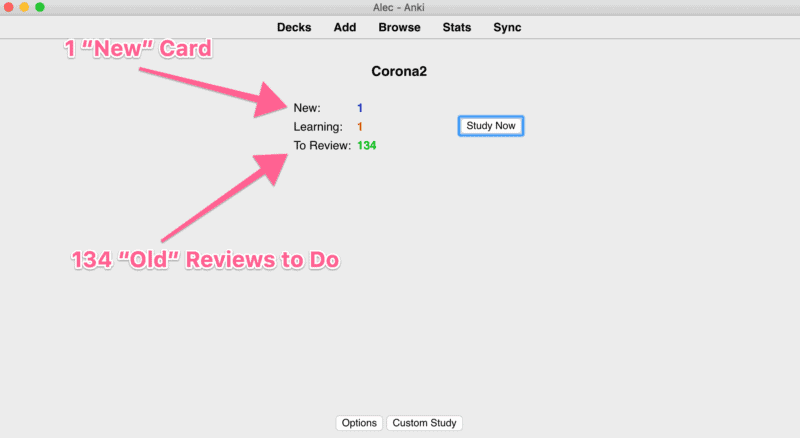
What is a "new" vs. "one-time" review? New cards = ones you haven't seen before. "Old" reviews = cards y'all've seen before, that you're supposed to review according to Anki.
Even so, after multiple correct reviews, I will call back that information for much longer. Anki volition bear witness me that data much later.
For illustration, the average interval for my cards is 4 years. That ways, on average, I will remember my cards for 4 years. I can remember so much information considering I have done my Anki reviews daily for 10+ years.
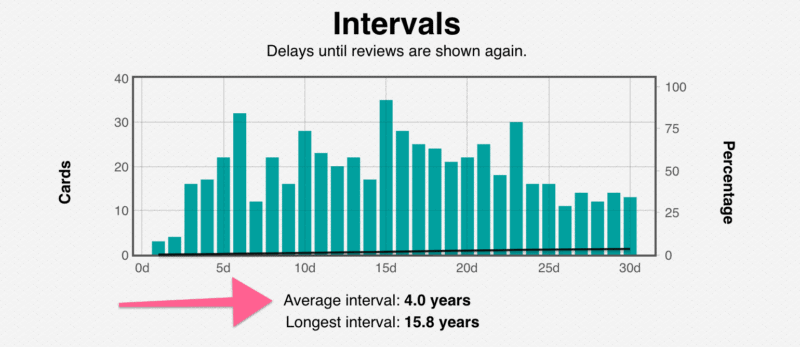
On average, I volition remember my cards for 4 years. How? Considering for the past ten years, I've washed my Anki reviews every day.
At a Minimum, Practice Your "Due" Cards Every Day
Every day, the program will prompt you lot to review all your "due" cards. This is the data the algorithm predicts you are virtually likely to forget on that day.
If you practice Not review your cards every twenty-four hours, yous volition forget more information. Plus, it will be harder to grab upwardly on your cards in subsequent days.
Let's say you were scheduled to review 200 cards on 24-hour interval 1, and 200 unlike cards on Solar day two. If you skip today'southward reviews, yous increase the burden of tomorrow. So instead of doing 200 cards as planned, you will be doing 200 cards PLUS whatever you lot hadn't done the day previous.
Finally, you volition forget the skipped cards more often, and they volition take longer to review.
Some of the about painful days of med school have been when I skipped 1-2 days of reviews. Please learn from my mistakes and review your cards every day.
5. How Many New Cards Should I Make/Review Every Day?
Short Answer:
Make and review xxx-twoscore new cards/day to start. You may do more equally yous become more comfy, but be conscientious to minimize lists/memorization.
Detailed Answer:
Recall the iii most common mistakes students brand with Anki are:
- Memorizing lists of facts without understanding the underlying concepts
- Making cards on everything that "might" be useful
- Not doing their Anki reviews every mean solar day
It's easy to make 100+ Anki cards in a day. The bug with making lots of Anki cards is:
- They're usually not very practiced
- Your day will be filled with Anki and cipher else (like QBanks)
Instead, force yourself to make only thirty-40 new cards/mean solar day to outset. (New cards are ones you haven't reviewed yet. Remember: y'all should be doing all "old" reviews every twenty-four hours). You lot tin can review the cards the same day you make them using this article here.
If you're struggling, endeavour the Yousmle Step 1 or Step 2 CK cards. They will help you larn what a loftier-quality menu is, and focus your fourth dimension on mastery rather than re-creating the wheel.
half dozen. What Settings Should I Use for My Anki Reviews?
Short Reply:
Set new cards to 40 max until you're comfortable with the card load. Set "maximum reviews/day" to 9999.
Detailed Respond:
Anki defaults to 100 old cards reviewed/day. Even if 200 cards might exist due on that item mean solar day, Anki will simply show you 100 old reviews.
This is meant not to overwhelm you. However, it doesn't allow you lot to use Anki to the fullest, so I recommend setting information technology to some high number (due east.g., 9999).

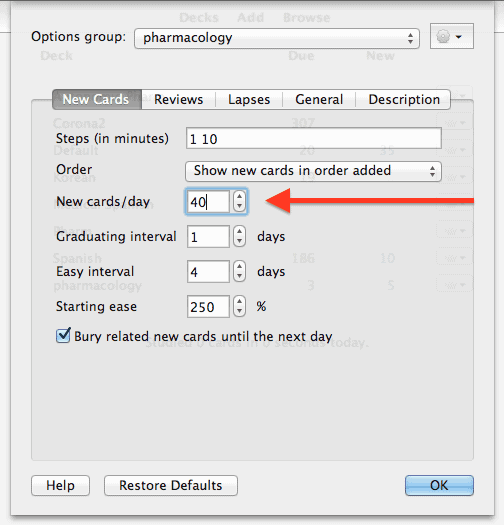
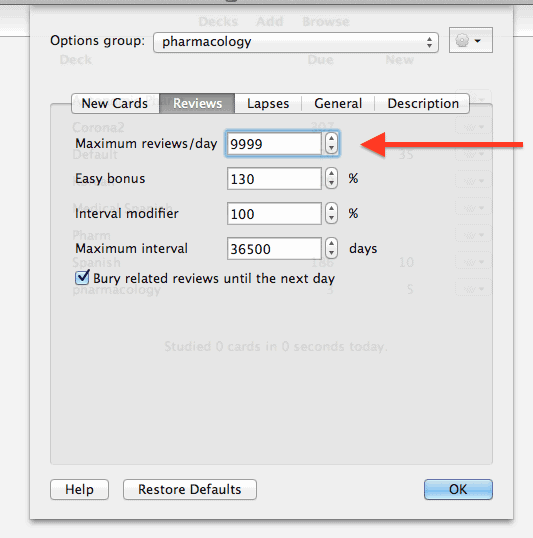
7. What Should I Put Into My Med School Anki Cards?
Short Answer:
Don't memorize. Stick to the most important concepts/facts, past using:
- First Aid data (especially if you can make sense of information technology),
- QBank "educational objectives" w/ explanations,
- Pathogenesis to presentation cards from sources like Pathoma
Detailed Answer:
How many cards y'all make – and what kinds – is a critical chemical element to med schoolhouse Anki success. Go it wrong, and you'll create a lot of unnecessary suffering for yourself. Go it right, and y'all can take skyrocketing USMLE scores.
There is a collective delirium in medicine that the key to success in medicine is to cram lists of facts. They believe the more you memorize, the better you lot volition do on Step 1.
How is it, though, that people who score 250+ never credit memorization as the key? Every single person I've met/tutored with 250+/260+ on USMLEs did it via mastery, not memorization. I've spoken with USMLE test-writers who say the same affair: memorization courts thwarting.
Memorization is a Fool's Errand
I've worked with many students who previously failed the USMLE. Every one of them tells the same story:
They tried to memorize their style through. No affair how many times they repeated UFAP, they couldn't seem to raise their scores.
The problem wasn't in the resources. (Although generally, I prefer agile over passive learning). The problem was that they'd given upwards on trying to learn mechanisms, and simply relied on memorization.
To read more than about what I put into my Anki cards, read this article.
8. How Long Should it Take to Review Anki Every Mean solar day?
Brusque answer:
- Old cards: ≤ 1 hour per 100 reviews
- New cards: ane-2 minutes/new review
Detailed answer:
I aim for reviewing 100 quondam cards/60 minutes, and 1-2 minutes per new card reviewed. In other words, permit's say you had:
- 300 old cards and
- 45 new cards to review
I would await it to accept ~four hours total (3 hrs for the former cards, and 45-90 mins for the new cards).
Cards that take too long will steal valuable time spent on other things, including:
- QBanks
- Mastery of topics, and
- Having a take chances at a semi-normal life outside of medicine
What if information technology takes y'all more than an hr to exercise 100 onetime reviews? It's usually because:
Cards Are Too Long
This is the #ane reason each carte is taking as well long. If there is too much data on each carte, information technology will take you too long. Yous tin check out Bones Anki Carte Creation: The Consummate Guide for Med Schoolhouse and the USMLE Footstep Exams. Encounter the Yousmle Step 1 and Step ii CK cards for examples of cards that are an appropriate length.
Perfectionism
Some people go overboard, and attempt to learn every single word of every card. That's a mistake. Instead, brand certain y'all sympathize the concept.
Distractions (e.g., Email, Social Media, Internet, etc.)
Email gets me every time. As does news sites. If you lot observe distractions always block your focus, wait at programs similar Freedom.
Reviews When Y'all're Tired/At Night
Skilful Anki cards – the ones with deeper explanations/connections – require focus. It's harder to exercise these cards late at dark. For instance, it takes me roughly 50% more time to do cards late at night compared with the morning. Be sure y'all are getting enough sleep, and that you're doing your reviews when you're energized, non tired.
nine. Should I End Reviewing My Former Anki Cards After Each Schoolhouse Exam?
Short Reply:
If you made good cards, I'd recommend continuing them. If they're pure memorization? Maybe not. (Merely you shouldn't make memorization-heavy cards, to begin with, right?)
Detailed Reply:
This is a personal question, and the reply will depend on your particular goals. My goals were to:
- Learn information well for the exam, but also to
- Dominate the USMLE Footstep 1 exam,
- Make Shelf studying easier,
- Know more answers on rounds, and ultimately
- Exist a amend md/teacher who could explain non only what treatment we were doing, but also why
Every bit such, even subsequently a particular school exam, I continued to review all the Anki cards from that subject area. Because the cards fostered mastery – not memorization – I accomplished those goals. (And much more).
"But Weren't the Cards From Your School Exams' Depression-Yield' for Step ane?
Students obsess over "high-yield" subjects for the USMLEs. ("High yield" means things that are tested more often than others). However, the truth is that no one knows what will be on their exam before they accept it.
(To read How to Ensure Your USMLE Studying is "High Yield", click here).
They tin can examination you on (almost) anything. Especially if yous desire a 250+, you need to move across UFAP.
You've heard stories from high-scorers who got questions right simply from lecture textile. Are these common? Probably not. But then again, getting a 250+ on the USMLE is not common, either.
Let me be articulate: this is not to say that you should memorize every detail in lecture. UFAP is an excellent offset if you use it properly.
Ultimately, information technology depends on what you lot believe practiced USMLE scores require. Do you lot have the NBME at their discussion, that they want you to chief concepts and non memorize details? Then proceed your old cards. Practice you recollect the USMLEs are about remembering facts? Then doing your old cards probably doesn't make sense to you.
10. What Are the Benefits of Reviewing All of Your Old Anki Cards?
Short Answer:
There are many benefits, every bit long equally they're good cards. Benefits include minimizing re-learning the same data and facilitating learning subsequently blocks.
Long Reply:
It's common to learn subjects only for our upcoming test and forget it afterward. Even so, retaining prior content volition accelerate future studying.
Many concepts within medicine repeat in later blocks. You tin can't understand pulmonary edema without agreement cardiology/heart failure. Biochemistry comes back with a vengeance in GI and endocrinology. Diabetic ketoacidosis spans biochemistry, GI, and endocrinology.
At Stanford, I could explain things that many of my classmates needed to memorize. Why? Because I had retained the explanations from previous lectures. Additionally, so many subjects repeated over and over. As such, I spend less time re-learning topics that came upward once again and again.
For instance, nosotros'd covered renal physiology in our pharmacology diuretics section. I connected to review those cards subsequently our examination. Equally a result, I breezed through the aforementioned information after during out:
- Cardiology'southward hypertension direction lecture, as well as
- Renal physiology lectures
If you've invested the time to make/do loftier-quality reviews, it pays to continue them.
11. What Should I Do with My Anki Cards Afterward I End Step 1?
Short Answer:
I continued near all my cards, which helped immensely for Shelf exams, and Footstep 2 CK. It'due south hard to exercise all your reviews if you don't take time off afterward your second yr, although people have made it work.
Detailed Respond:
Once more, this is a very personal question. Information technology volition depend on your goals and your particular circumstances. I was fortunate to have received an HHMI Research Fellowship after my second year. As such, I took a research year later the USMLE Step 1.
At their superlative could have roughly 2-3 hours a mean solar day to review ~250-300 old cards. Past having a inquiry year, I had the time to continue those reviews.
The demands of clinical clerkships are more pregnant than a typical inquiry year. It'southward daunting to find fourth dimension for:
- Doing former Anki cards, while simultaneously
- Learning the ropes on an inpatient service and
- Studying for a shelf exam is daunting
The benefits of continuing your Step ane reviews? Recalling the majority of Step i/course information helped immensely for Shelf exams. (I honored all my third-year Shelf exams by only doing QBank questions). Additionally, despite a year off earlier clerkships, the information was nonetheless fresh. It as well helped a LOT for answering questions on rounds.
12. What Is the All-time Way to Study Anki Cards During Clerkships?
Short Answer:
Use hospital computers, and employ Ankiweb. Avert studying on your phone.
Detailed Reply:
I'grand going to level with you. As a clerkship student, yous are:
- Expected to be in the hospital for long hours
- Unable to do a lot of useful tasks
You besides accept all-important clerkships evaluations, which are high subjective.
It's i of the most frustrating positions to be in. You lot are capable of writing a skillful progress note. However, even if you did, they can't use information technology for billing purposes, so the intern will write their own. Y'all can't put in orders, and at least in the first, you don't have a lot of useful skills.
Just you likewise have a Shelf exam to study for! Frequently, the optics of studying for an examination while in the hospital aren't good. Even worse, if someone sees you on your phone, they volition presume you lot're:
- Checking your electronic mail
- On Facebook
- Don't intendance
Do Anki Cards on Hospital Computers Using Ankiweb
So how can you do your Anki cards, while not invoking the rage of your team? By studying on a hospital figurer, using Ankiweb. Ankiweb is a cloud-based awarding you tin use to study your cards from anywhere. All yous have to do is create an account, and sync information technology with your mobile/desktop app.
The added benefit of studying on a hospital reckoner is that y'all tin do useful work. A lot of inpatient medicine involves waiting. Waiting for:
- Labs
- Consult recommendations
- Radiology reads
- Social work/disposition plans
Your team probable has a lot of things they need to do. If you check every 15-twenty minutes for updates on the things yous're waiting for, you lot can exist a huge help. You tin also avert looking disengaged.
13. How Many Anki Decks Should I Brand? Should I Have One Large Deck, or Decks for Each Lecture?
Short Respond:
I recommend making 2 decks, pharmacology, and non-pharm (including pathology, physiology, micro, etc.). At most, 3 if yous'd like a separate micro deck.
Detailed Reply:
The more decks you make, the more than deadening reviews become. As such, I recommend creating fewer decks.
For example, let's say I made six separate decks for:
- Renal,
- Cardiology,
- Pharmacology,
- Pathology,
- Physiology, and
- Microbiology,
Instead of opening a single deck, every day, I'd take to open six. It might non seem similar much in the commencement. However, this becomes very deadening (not to mention discouraging). Any friction to reviewing your cards makes it less probable you lot'll actually practice them.
Written report Step 1 Pharmacology Separately So You Can Learn It Little by Little
So why would I recommend making two decks instead of one? Because having lots of pharmacology cards can overwhelm a single deck. To illustrate this, allow'southward say that I had one deck, with:
- 1,000 non-pharmacology cards in it, 100 of which are "new." ("New" meaning I have created them but non reviewed them yet).
One day, I get on a gyre, drink a glass of wine or two, and create 500 pharmacology cards at once. Now, among my new cards, I have:
- 100 non-pharmacology questions, and
- 500 pharmacology questions.
However, I have a trouble. If I were to review twoscore new cards a day, roughly 5 in half dozen of them would be pharmacology cards. This ways I would only be moving through my new non-pharmacology cards at one/6th the pace.
Learning pharmacology is ane of the most challenging tasks for the USMLE Step i. It's also hugely rewarding.
The most effective way to learn pharmacology is to do information technology chip by bit. Many students cram pharmacology during the final several weeks earlier their exam. Virtually every crammer regrets information technology, as information technology is painful and ineffective.
Instead, create a separate pharmacology deck. Set the daily new bill of fare review limit to something reasonable, like 20 cards a day.
If yous're trying to blitz microbiology, y'all may try the aforementioned thing, and create a tertiary deck.
(To read How to Master Stride 1 Pharmacology Over a Glass of Wine, click here).
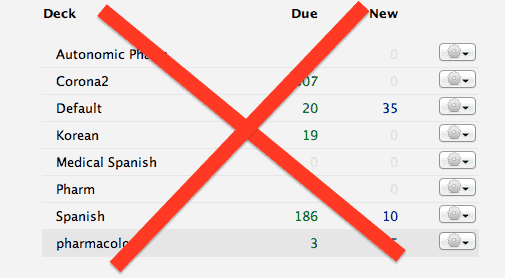
An example of what NOT to do – likewise many decks creates boring daily reviews
14. How Can I Get All of Alec's Cards He Used to Score 270 on Step 1?
Information technology sounds tantalizingly unproblematic: learn the cards from a loftier-scorer, and go the same score! Unfortunately, information technology's never that easy.
By the fourth dimension I took Step 1, I had 15,000+ cards I'd made in the i.five years preceding my exam. Trying to exercise all the cards would exist counterproductive. You likely wouldn't have plenty time to go through them. Even if in that location were plenty time, it would away time for other critical activities. Almost importantly, many of the explanations would but make sense to me.
Think about this the side by side time you lot consider using Zanki or other "comprehensive" deck. (I don't recommend Zanki, nor does this quondam Zanki/Brosencephalon user).
Instead, I've created Pace 1, Footstep 2 CK, and Pharmacology Decks for auction. These decks:
- Explain the most challenging/ important USMLE topics
- Brand connections that will allow y'all to translate any question on your exam
- Are the right length, then if you desire, you tin make better cards yourself
Each contains a much more manageable number of cards (1200-1800+). From my constant piece of work as a tutor, these cards help yous primary the virtually challenging topics.
Click to learn more than almost the Step ane and Pace 2CK Anki decks.
15. ???
I'm certain at that place are questions hither that I oasis't addressed. Allow the states know what your questions are in the comments section!
What to Practice Adjacent?
- Bank check out the Resource Page for my summit recommendations of tools I used to score 270
- If you haven't yet, download Anki
- Stressed for fourth dimension?Invest in AnkiMobile – I've saved literally hundreds if not thousands of hours by being able to review my cards whenever I have a spare moment (on the bus, waiting for a consult to call me back, etc.)
- If you're starting for the outset fourth dimension, remember to start slow (target thirty-twoscore cards/day to make, and to add to your deck). The key is to develop good habits, and then to expand your reviews as y'all become more comfortable.
- Leave a comment beneath with your own question(southward)!
Photo past George Donnelly
gordoninitime1973.blogspot.com
Source: https://www.yousmle.com/med-school-anki-faq/
0 Response to "Anki Wont Give Me New Cards but Reviews Come"
Postar um comentário